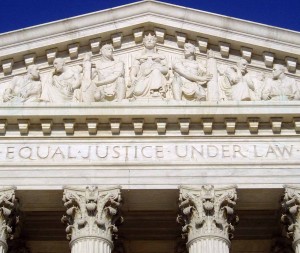“There can be no equal justice when the kind of trial a man gets depends on the amount of money he has.” — Hugo Black, Griffin v. Illinois, 351 US 12 (1956).
The simple truth that the poor should enjoy the same right to effective counsel as the rich is one of the most fundamental tenets of our American judicial system. Though Justice Black’s classic opinion in Griffin v. Illinois is over 50 years old, the spirit and substance of the case continue to inform American legal policy and constitutional interpretation.
It was in this admirable tradition that the Criminal Justice Act was enacted, and to this day CJA panel attorneys carry on the legacy of equal justice established by Gideon, Griffin, and their progeny. In the spirit of Justice Black’s memorable words, the Criminal Justice Act provides CJA-appointed attorneys not only with compensation for representation of the indigent, but also with the resources to obtain “investigative, expert, and other services” necessary for adequate representation. 18 U.S.C. 3006A(e).
Upholding the CJA’s Central Mandate: Providing Adequate Representation
The CJA requires each U.S. District Court to establish “a plan for furnishing representation for any person financially unable to obtain adequate representation.” 18 USC 3006A(a). Hidden in this seemingly straightforward sentence is a provision that can help CJA panel attorneys provide adequate and effective representation to their client, and it hinges upon the court’s definition of “representation.”
In colloquial use, representation in the legal context has come to mean simply representation by counsel. However, the plain language of the CJA makes it clear that lawmakers had a more holistic view of “representation” in mind when drafting the CJA. The statute requires U.S. District Courts to establish a plan for representation of indigent clients that includes not only counsel, but also “investigative, expert, and other services necessary for adequate representation.” 18 USC 3600A(a). It is clear then, that the statute imagines a scenario under which counsel alone will not be sufficient for adequate representation. To that end, lawmakers included a provision in the CJA making expert and investigative services not only available to CJA attorneys, but exceedingly accessible.
18 USC 3600A(e) – “Services Other Than Counsel”
The Criminal Justice Act expressly allows CJA attorneys to obtain professional services, including investigative services, via two methods – upon request and without prior request.
Under the first scenario, counsel can request additional services through ex parte application. If the court then determines that the services are necessary and that the person being represented is unable financially to obtain them, the court will authorize counsel to obtain up to $2,400 of such services.
Alternatively, a CJA-appointed attorney may be entitled to additional services without prior approval from the court. The statute provides that appointed counsel may obtain “investigative, expert, and other services” without prior authorization if such services are necessary for “adequate representation.” Services obtained without prior request are limited to $800 and are subject to later review by the court.
When are investigative services “necessary” for adequate representation?
Though it’s clear the CJA comprehends situations in which adequate representation will require more than simply representation by counsel, the statute fails to expressly define when such services will be “necessary.” Though largely unsettled amongst circuits, the few articulated tests for necessity do not appear to set a high bar of need.
Take, for instance, the test articulated by the Ninth Circuit in U.S. v. Bass. The test for necessity set forth in Bass requires that additional services be approved by the court in “circumstances in which a reasonable attorney would engage such services for a client having the independent financial means to pay for them.” U.S. v. Bass, 477 F. 2d 723, 726 (9th Cir. 1973).
This “reasonable attorney” standard does not require dire need on behalf of the client. Rather, the holding in Bass makes clear that CJA-panel attorneys are entitled to act on behalf of their client just as they would if the client had financial means to obtain private counsel.
What does this mean for CJA attorneys?
Both the plain language of the statute and the relevant case law make it clear that “adequate representation” includes more than simply representation by counsel. The CJA explicitly requires that additional funds be made available for “expert, investigative, and other services” when necessary for “adequate representation” – with or without prior approval from the court.
Circuit courts, for their part, have interpreted the plain language of the statute in a manner that does not set an onerous burden for attorneys seeking to obtain additional services for their client. CJA attorneys seeking to obtain additional services need to simply ask themselves the following: “If I were representing a wealthy client, would I obtain these services?”
If a CJA attorney answers this question in the affirmative, yet fails to obtain additional “expert, investigative or other services,” it would be unlikely their client was provided with the “adequate representation” required by the Criminal Justice Act.
Submit a case now, or call IISAZ now at (520) 882-2723 or (602) 358-7759.







